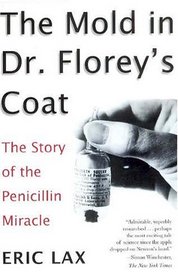This book was, at least to me, a fascinating story. Probably because I used to write and lecture on how insects affected history---mostly by the diseases they vectored. As a result, I also became interested in diseases which were not vectored by insects or ticks. In fact, the book I usually recommend to others is The Great Influenza, the story of the "Spanish Flu" epidemic, a disease not vectored by insects. Much of that book is devoted to the development of American medicine, but when you read about the politics surrounding the "Spanish Flu" you have to wonder how we could have been so stupid as to make them again with Covid.
Why this book is titled The Mold in Florey's Coat is a short but interesting story due to World War II. Most of the book is dedicated to the efforts of scientists striving to get support from political and governmental entities which had no idea of the vast importance of the possibilities of penicillin. When you read how the British medical scientists achieved their success scrounging parts from everywhere---except from medical supply companies---you are awed by their efforts. Especially when they work hard to achieve grants of just 200 pounds.
One nice aspect is that the American Rockefeller Foundation was one of their earliest supporters. There is a lot of grief expressed by the British scientists that it was the Americans government and medical companies---but not British--- which placed the development of penicillin as a top priority. In fact, the author comments the U.S. placed the production of penicillin only second to the atomic bomb. This was due the the British attitude of their scientists avoiding any commericalization of their discoveries. That later changed.
Then there was the fight over who got the credit. This was also due to British attitudes about publicity. As a result. Alexander Fleming is often credit with the discovery and development of penicillin. While Fleming discovered it and saw its potential, he then left it to work on other things. Only after a decade later did a trio of scientists---Howard Florey, Ernst Chain and Norman Heatley---undertake the huge task of its development. Only much later did the last three receive their due credit, but Heatley did not receive the Nobel Prize, as did the others.
Why this book is titled The Mold in Florey's Coat is a short but interesting story due to World War II. Most of the book is dedicated to the efforts of scientists striving to get support from political and governmental entities which had no idea of the vast importance of the possibilities of penicillin. When you read how the British medical scientists achieved their success scrounging parts from everywhere---except from medical supply companies---you are awed by their efforts. Especially when they work hard to achieve grants of just 200 pounds.
One nice aspect is that the American Rockefeller Foundation was one of their earliest supporters. There is a lot of grief expressed by the British scientists that it was the Americans government and medical companies---but not British--- which placed the development of penicillin as a top priority. In fact, the author comments the U.S. placed the production of penicillin only second to the atomic bomb. This was due the the British attitude of their scientists avoiding any commericalization of their discoveries. That later changed.
Then there was the fight over who got the credit. This was also due to British attitudes about publicity. As a result. Alexander Fleming is often credit with the discovery and development of penicillin. While Fleming discovered it and saw its potential, he then left it to work on other things. Only after a decade later did a trio of scientists---Howard Florey, Ernst Chain and Norman Heatley---undertake the huge task of its development. Only much later did the last three receive their due credit, but Heatley did not receive the Nobel Prize, as did the others.




![header=[] body=[Get a free book credit right now by joining the club and listing 5 books you have and are willing to share with other members!] Help icon](/images/question.gif?v=90afaeb39)
